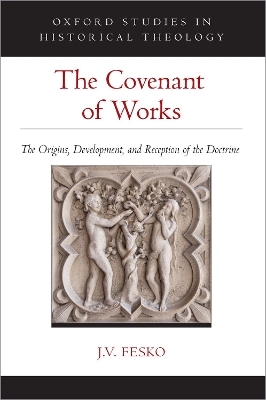
The Covenant of Works
The Origins, Development, and Reception of the Doctrine
Seiten
2020
Oxford University Press Inc (Verlag)
978-0-19-007136-3 (ISBN)
Oxford University Press Inc (Verlag)
978-0-19-007136-3 (ISBN)
The doctrine of "the covenant of works" arose to prominence in the late sixteenth century and quickly became a regular feature in Reformed thought. Theologians believed that when God first created man he made a covenant with him: all Adam had to do was obey God's command to not eat from the tree of knowledge and obey God's command to be fruitful, multiply, and subdue the earth. The reward for Adam's obedience was profound: eternal life for him and his offspring. The consequences of his disobedience were dire: God would visit death upon Adam and his descendants. In the covenant of works, Adam was not merely an individual but served as a public person, the federal head of the human race.
The Covenant of Works explores the origins of the doctrine of God's covenant with Adam and traces it back to the inter-testamental period, through the patristic and middle ages, and to the Reformation. The doctrine has an ancient pedigree and was not solely advocated by Reformed theologians. The book traces the doctrine's development in the seventeenth century and its reception in the eighteenth, nineteenth, and twentieth centuries. Fesko explores the reasons why the doctrine came to be rejected by some, even in the Reformed tradition, arguing that interpretive methods influenced by Enlightenment thought caused theologians to question the doctrine's scriptural legitimacy.
The Covenant of Works explores the origins of the doctrine of God's covenant with Adam and traces it back to the inter-testamental period, through the patristic and middle ages, and to the Reformation. The doctrine has an ancient pedigree and was not solely advocated by Reformed theologians. The book traces the doctrine's development in the seventeenth century and its reception in the eighteenth, nineteenth, and twentieth centuries. Fesko explores the reasons why the doctrine came to be rejected by some, even in the Reformed tradition, arguing that interpretive methods influenced by Enlightenment thought caused theologians to question the doctrine's scriptural legitimacy.
J. V. Fesko is Professor of Systematic and Historical Theology at Reformed Theological Seminary, Jackson, Mississippi. He is the author of numerous books on early modern Reformed theology, including Beyond Calvin: Union with Christ and Justification in Early Modern Reformed Theology and The Covenant of Redemption: Origins, Development, and Deception.
Introduction
The Reformation
Robert Rollock
Jacob Arminius
James Ussher
John Cameron and Edward Leigh
The Westminster Standards
The Formula Consensus Helvetica
Thomas Boston
John Colquhoun
The Twentieth Century
Conclusion
Bibliography
| Erscheinungsdatum | 01.10.2020 |
|---|---|
| Reihe/Serie | Oxford Studies in Historical Theology |
| Verlagsort | New York |
| Sprache | englisch |
| Maße | 160 x 239 mm |
| Gewicht | 612 g |
| Themenwelt | Geschichte ► Teilgebiete der Geschichte ► Religionsgeschichte |
| Religion / Theologie ► Christentum ► Kirchengeschichte | |
| ISBN-10 | 0-19-007136-2 / 0190071362 |
| ISBN-13 | 978-0-19-007136-3 / 9780190071363 |
| Zustand | Neuware |
| Informationen gemäß Produktsicherheitsverordnung (GPSR) | |
| Haben Sie eine Frage zum Produkt? |
Mehr entdecken
aus dem Bereich
aus dem Bereich
Von den Anfängen bis zur Gegenwart
Buch | Hardcover (2022)
C.H.Beck (Verlag)
34,00 €
Herkunft, Blüte, Weg nach Osten
Buch | Hardcover (2024)
C.H.Beck (Verlag)
39,00 €


